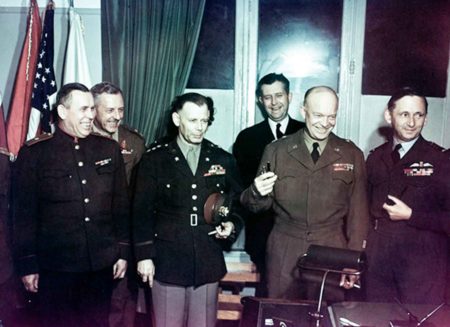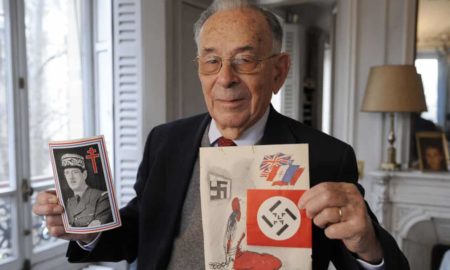One of the sections I always read in the Saturday editions of the Wall Street Journal always contain multiple book reviews. When a review sparks my interest as a potential source for a blog topic and future books, I usually purchase the book.
Well, there was a review on Meryl Frank’s new book in the Journal on 17 April 2023 (see below in the recommended reading section). It grabbed my attention because Ms. Frank, the former mayor of Highland Park, New Jersey, was entrusted by her elderly aunt with a thin book written to memorialize the murders of Jewish theater performers by the Nazis. Aunt Mollie turned the book over to Meryl with the instruction to keep the book safe and pass it on to her children.
However, Aunt Mollie made Meryl promise to never read the book.
Did You Know?
Did you know that Hitler and his generals made a lot of mistakes about the Allied invasion of Normandy? On the Allied side, Gen. Eisenhower was the “Supreme Commander-in-Chief” with defined lines of authority, but the Germans had a convoluted command structure. While Rommel was put in charge of the defenses, he reported to Field Marshal Gerd von Rundstedt (click here to read the blog, OB West) but neither Rommel nor Rundstedt had any power. The German navy, air force, and Schutzstaffel (SS) reported directly to Hitler.
Most of the key German commanders were absent from their posts at the time of the invasion on the morning of 6 June 1944. They were all in bed with their mistresses except for Rommel. He went back to Germany for his wife’s birthday.
Hitler went to bed late on 5 June and gave orders he was not to be awakened for any reason. He actually slept through the invasion. When he woke up and was told about the landings, Hitler believed this was a diversionary attack because he was convinced the primary invasion would take place at Pas de Calais. Therefore, he waited too long to dispatch his Panzer tanks to Normandy. The deception was due to the success of British counterintelligence being able to turn German spies into double agents with false invasion information fed to Berlin. Because the Allies had broken German codes, they knew senior command officers (as well as Hitler) were convinced the covert information was real. (Click here to read the blog, Double Cross System.)
The Germans believed any invasion would be delayed at that time because of bad weather in the North Sea and English Channel. However, Eisenhower gave the order to proceed with the invasion in the early morning of 6 June after his weather experts predicted a favorable break in the weather. The German weather-forecasting broke down and Hitler’s experts did not see the window of opportunity. (Click here to read the blog, The Historical Weather Forecast.)
Many of the German soldiers manning the coastal defenses were conscripts from Nazi-occupied countries. They did not want to die for the Nazis and gave up easily. The German Kriegsmarine, or navy was virtually absent in the English Channel. The largest wartime armada left England and crossed the channel unimpeded. The German Luftwaffe, or air force had lost control of the skies and its last remaining fighter squadrons in France had been moved too far away from the beaches to be effective.

I guess winning a war ultimately boils down to the side that has the luckiest generals and makes the fewest mistakes.
Aunt Mollie
By 1996, Mollie was in her mid-eighties. She was the sister of Meryl Frank’s mother and the family’s self-proclaimed “Memorial Candle.” In other words, Aunt Mollie was responsible for the remembrance of her family and ensuring the family stories were carried on to the next generation.
Meryl was the youngest of four sisters and named after her maternal grandmother. As Meryl grew up, Aunt Mollie’s stories introduced her to various family members including Meryl’s grandparents who emigrated to the United States in 1905 passing through Castle Garden, the precursor to Ellis Island. Meryl’s grandmother, Meryl Kagan, lived in Vilna, Lithuania until she married Michel and became Meryl Boyarsky. Read More Don’t Read This




